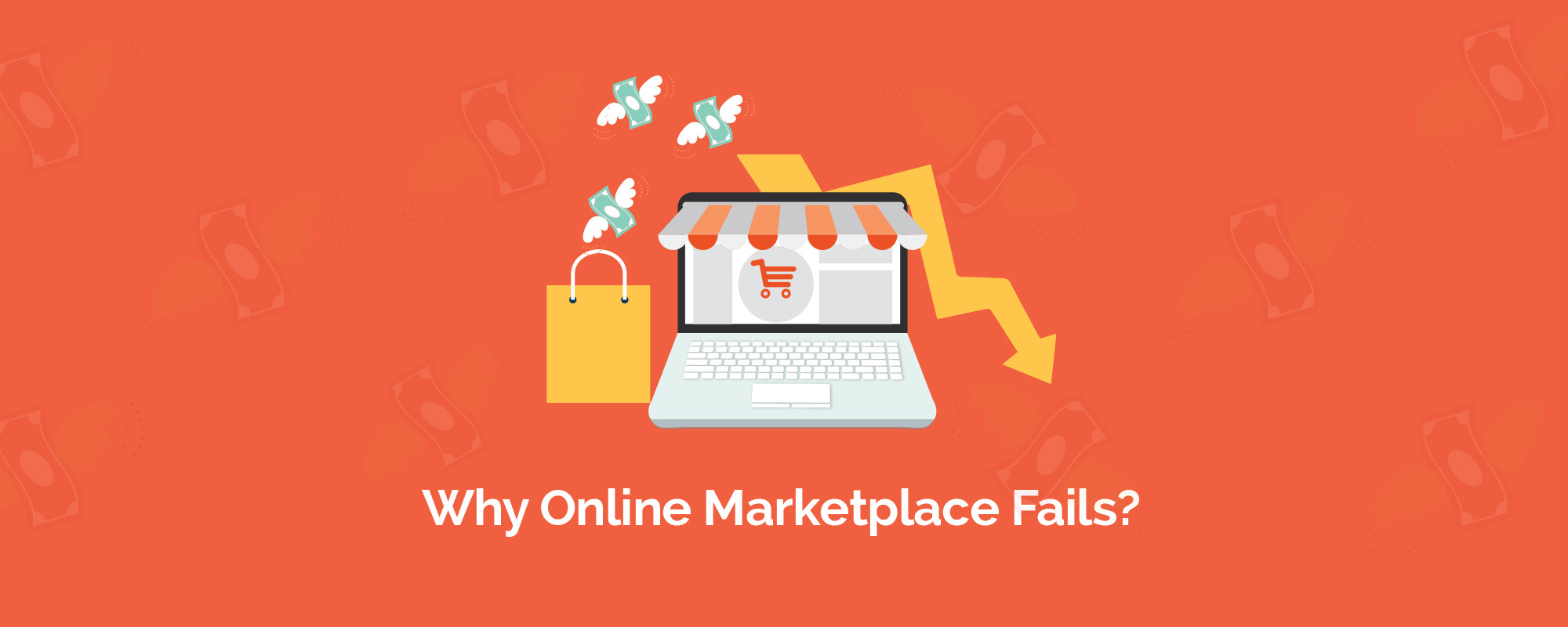Online marketplaces, whether peer-to-peer or multivendor, are raking up millions in seed funding. Interestingly, they are also failing in large numbers as compared to other web driven startups. Many based on unique ideas are launched with huge fanfare but turns out a disaster as months pass by.
FATbit Technologies has witnessed the demise of many such marketplaces in last one decade, and studied them to discover reasons of their collapse. In this blog post, we are sharing all the practical points due to which young online marketplaces fail to build user base and never make money.
In short, we will tell you ‘how not to build a marketplace website’ if you plan on launching one.
The marketplace killer points fall under different categories and appear at different stages of project life cycle. Here is where most marketplaces go wrong:
- Initial planning
- Business model
- Website technicalities
- Website marketing
- Other issues
These points encompass nearly everything that’s associated with building an online venture. That’s why we need to discuss the exact points that can leave you with marketplace disappointment. So, let’s get down to it!
Initial planning
Launching your website on the basis of limited market research and little insights about your customers can do more damage than good. When a unique marketplace idea hits entrepreneurs, the urge to launch it immediately is strong. In this haste, they rush through market research, competitor analysis, and customer insights, which is a biggest mistake while building a marketplace website.
Another notable error we have seen marketplace owners make is not hiring dedicated professionals for analysis related tasks. While we all can run basic research, an expert will bring unique findings, market data, and project insights to the table. Sometimes, professionals are hired for the job but their suggestions are not taken into consideration due to cost and budget bottlenecks.
Financial planning is another aspect that is usually left for later. Questions like ‘how long can we go on until the investors show up’ are rarely bothered with. This is the wrong way to start an online marketplace.
Quick points:
- Limited understanding of market need and target audience
- Non dedicated professionals for business, market and competitor analysis
- Little attention to financial planning and cost estimates
Business model

Starting a marketplace website is very different from launching an online store. You not only require customers for your product or service but also need to build a base of service providers. This means you need to plan incentives and features to lure merchants as well while working on business model.
Keeping too broad a focus is another reason why online marketplaces fail. Finding your niche therefore is easier than trying to become the next Amazon. Some marketplaces fail to scale because they don’t begin with clearly defined revenue model.
Rushing to the development phase before perfecting business model is the recipe of marketplace disaster. This is true whether you are trying to build a marketplace like Etsy or something service based.
Quick points:
- Starting site development before finalizing business and revenue model
- Keeping a broad focus and failing to find a niche
- No plan to get merchants on board
Website technicalities
Just coming up with the perfect business plan and revenue generation model is not enough to turn a marketplace into a success story. You need a perfect website to leave the greatest impression on initial visitors and get recommendations. This is not possible until you get the website right, and by right we don’t just mean visually.
Building your online marketplace from scratch might be the job of technical team but it is your job to make sure that they get the user experience, SEO and conversion fundamentals right. Bad user experience means visitors will be dissatisfied. No search engine optimization means zero traffic from Google and Bing. Conversion optimization is critical in the similar manner. A marketplace based startup cannot survive with such setbacks.
Launching a website without thoroughly testing all its features is another reason of disappointed visitors.
Quick points:
- Technical glitches in live platform
- Zero focus on UX, SEO and conversion
- Ignoring recommendations from professionals
Website marketing
Some entrepreneurs are so charged up about getting the perfect website that it never occurs to them that they need money to market it as well. You need money to create brand awareness, reach target audience, and monitoring initial response after launch. All this needs money and spending all your financial resource on website development is not going to help.
Another reason why some online marketplaces fail to scale is that they never get the time. For a marketplace to scale, it is important to establish both buyer and seller communities which mostly takes few months to couple of years depending on the business. So, not starting a marketplace website is better than expecting it to start making money soon after launch.
Lastly, some startups are result of great minds that are often not the ones with marketing intellect. This is the reason that sometimes promising marketplaces fail to generate profits. What your marketplace needs is a marketing team that knows online marketing inside out.
Quick points:
- Not saving for marketplace marketing
- Giving up too soon on your venture
- Inept marketing team
Other issues
Besides points that fall under above mentioned categories, there are other reasons that can start the downfall of your marketplace. The biggest reason is choosing the wrong technology partner to build your marketplace. There are thousands of web design-development companies in the world but only few hundred have the expertise to deliver an UX rich and SEO optimized marketplace with unique features. And even though the task is challenging, you cannot afford to go wrong with that.
Haggling with your web services provider for a smaller marketplace price and compromising with website technology to save few dollars is another major issue. Accept the fact that your marketplace based venture will need money to build & scale, and start only if you have the budget for it.
Quick points:
- Compromise on budget and technology
- Wrong technology partner
- Ignoring system weaknesses
A lot can go wrong while building a marketplace or any online business from scratch for that matter. While we tried to cover most of the challenges associated with online marketplace development, we are sure there are more. What you need is a technology partner that can:
- Listen to your marketplace plans and needs
- Guide about technology and necessary resources
- Deliver UX, SEO and sales optimized marketplace website
It is only then you will generate maximum traffic for your online business and become a global name in the marketplace industry.
Start your online store with feature packed readymade solution


Comments (7)
 LonnieNum
LonnieNum
 JolynCoag
JolynCoag
 JolynCoag
JolynCoag
 FATbit Chef Post author
FATbit Chef Post author
 Maria Johnson
Maria Johnson
 FATbit Chef Post author
FATbit Chef Post author
 H Alaali
H Alaali
Very good forum post.Really looking forward to read more. Fantastic.
Very good article post. Really Cool.
Enjoyed every bit of your article.Much thanks again. Really Great.
Thanks for the appreciation 🙂
Cheers!
Thank you Varun for the post! I think that most of these projects fail because
1. They don’t have additional value
2. They don’t know their customer
You are welcome, Maria!
Thats correct.
Cheers!
Great article,.. straight to the point,.. thanks for sharing.